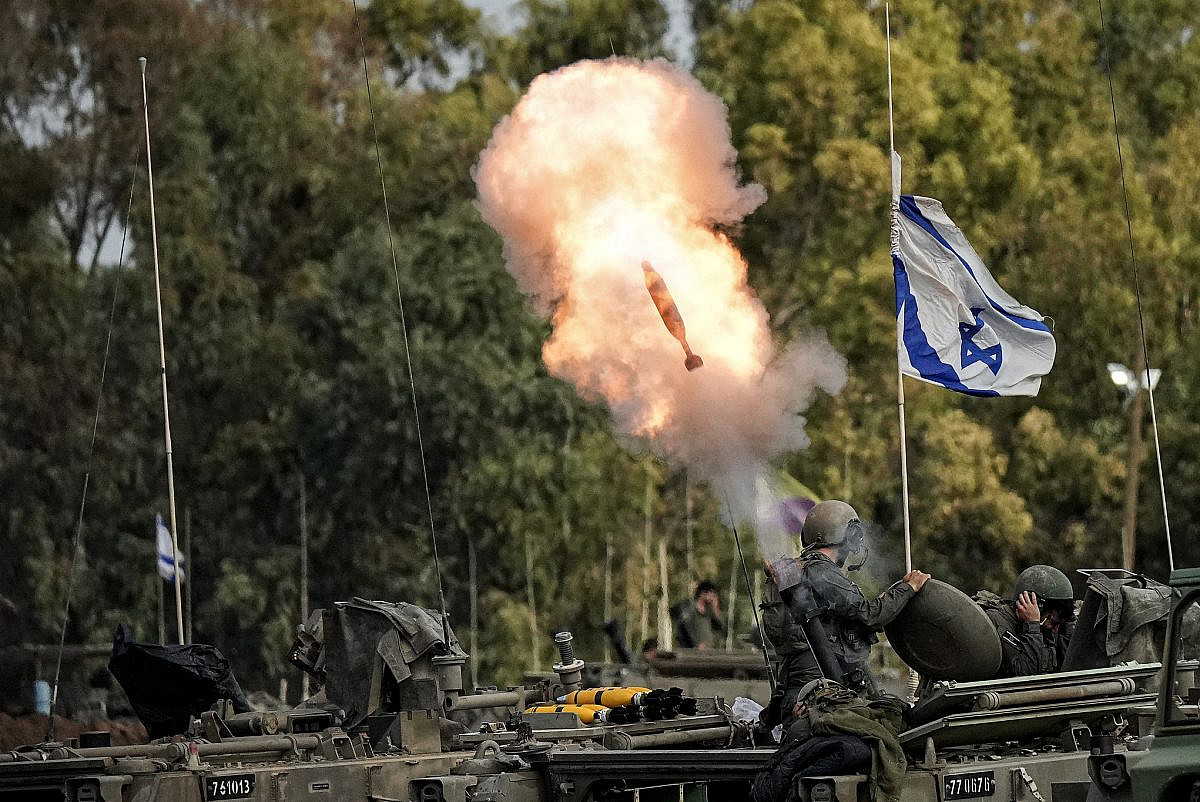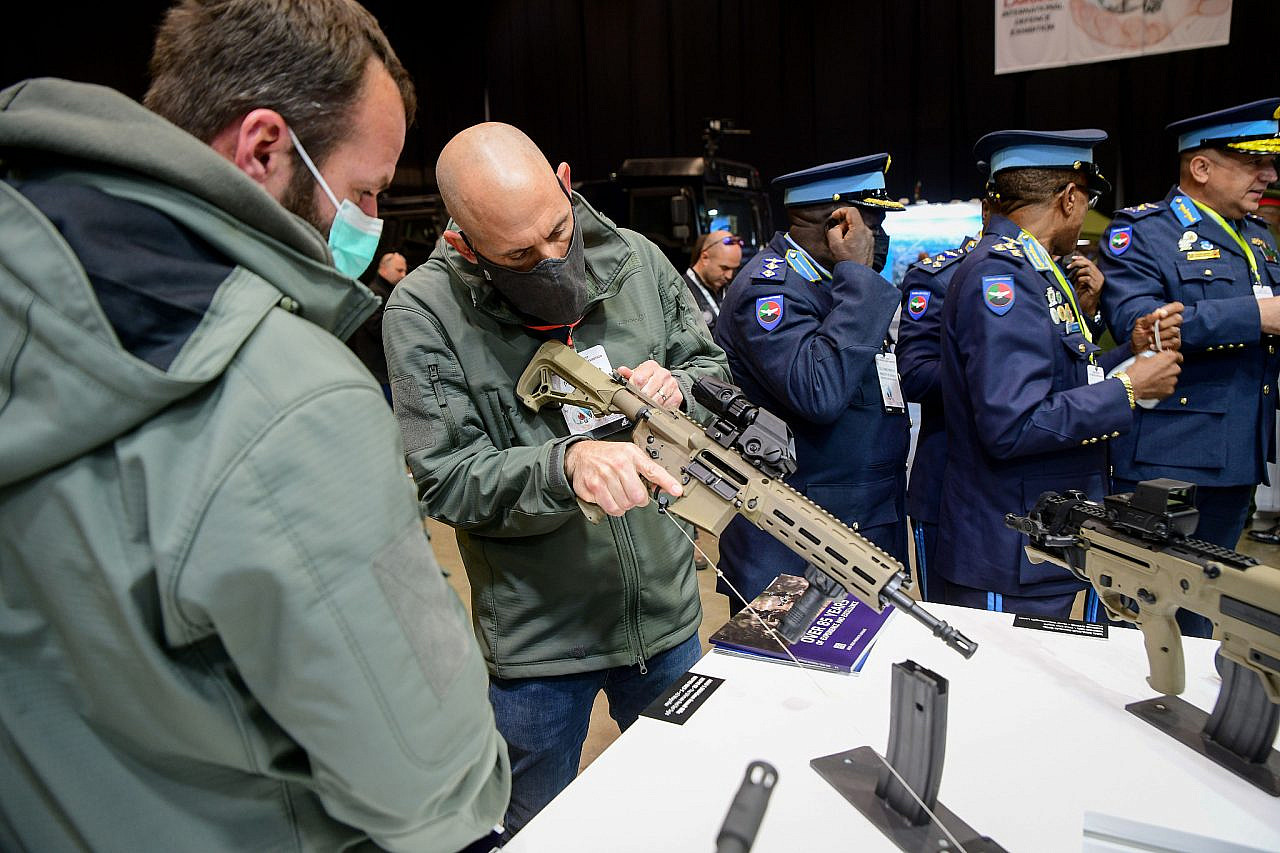In late November, the Israeli defense tech start-up Smartshooter posted a grainy photo on Facebook showing three Israeli soldiers aiming assault rifles at a blasted-out concrete building somewhere in the Gaza Strip. The caption reads: “The SMASH 3000 is now in action with the IDF Special Forces of Sayeret Maglan, transforming Close Quarter Combat (CQC) scenarios!” In an interview published by Ynet a month later, the company’s CEO, Michal Mor, framed Israel’s war on Gaza, which has killed almost 30,000 Palestinians, as a sales boost. “This is the finest hour of the defense industries,” Mor said.
This optimism about Israel’s military-technological prowess was strikingly out of sync with the failure of Israel’s military apparatus on October 7. For years, military heads have married Israeli military strategy to speculative futures, promising that better weapons and surveillance technologies would provide more security down the line. But none of the army’s supposedly state-of-the-art systems were able to prevent Hamas’ breach of the fence encaging Gaza nor the massacres that ensued.
Among leaders of Israel’s defense community, the horrific and tragic violence seemed to force, at least initially, a reckoning with the army’s overreliance on high-tech systems. Yet it appears that this reckoning has quickly run its course: no lasting changes to Israel’s military-industrial complex seem to be in store.
The Israeli army is once again marketing itself as a high-tech superpower, talking up the automated weaponry and supercomputing surveillance tech being “battle-tested” in its war on Gaza. Military spokespeople hope the same old slogans will distract from the fact that Israel is far from achieving its stated goals of eliminating Hamas and bringing the remaining hostages home, despite this being one of the most destructive military campaigns in modern history. As investors drop cash on Israeli weapons start-ups at faster and faster rates, defense tech CEOs are poised to be this war’s only victors.
A lucrative laboratory
On the one hand, the apparent bounce-back of the Israeli military technology industry is of a piece with skyrocketing arms sales worldwide. Governments have been stockpiling weapons in response to the Russia-Ukraine war, rising authoritarianism, and militarized responses to the COVID-19 pandemic, popular protest, and financial crashes. US arms sales to foreign governments rose by 49 percent in 2022, and Israel keeps breaking its own weapons sales records — a spike partly attributed to lucrative deals with neighboring Arab countries facilitated by the Abraham Accords. In 2022, Israeli defense exports were the highest they have ever been, raking in $12.5 billion.
Thanks to the war in Gaza, forecasters expect global 2024 sales to be even higher. In addition to multinational weapons conglomerates, investors are pouring cash into smaller start-ups, many of which are headquartered in Israel. Automated machine guns, covert cyberweapons, suicide drones, and AI-enhanced tanks are increasingly touted as Silicon Valley’s newest money-making technologies. Among those Israeli companies with the highest stock returns at the end of 2023 are start-ups advertising cutting-edge weaponry that is deployed by the army inside Gaza. Military tech is, after all, one of the few industries that seems to thrive off geopolitical instability.
Researchers have clocked a number of smaller companies advertising their wares as battle-tested in the current war. “Multiple new weapon systems have been tried for the first time now in Gaza,” Noam Perry, a research coordinator with the American Friends Service Committee — a US-based Quaker group tracking the weaponry used in Israel’s war on Gaza — told +972.
Amid unprecedented protests abroad and ICJ hearings on genocide in Gaza, multinational weapons conglomerates have remained relatively quiet about their involvement in Israel’s bombardment. Yet Perry said that smaller Israeli start-ups like Smartshooter have “been engaging in a massive PR campaign to publicize their product.” For start-ups, the unprecedented scope and duration of the destruction offer an equally unprecedented opportunity to sell weapons.
The current boom is coming on the heels of two decades of steady growth in Israel’s defense tech industry, which took off in the early 2000s. Against the backdrop of the Second Intifada and the global War on Terror, Israel began advertising itself as a homeland security capital. The makeover was pragmatic: the military needed more effective surveillance and weapons systems amid escalating regional conflict, and the economy needed a new PR strategy to lure foreign investors back to Israel.
Close ties between military and technology industries are by no means unique to Israel — after all, Silicon Valley began as an arm of the US Department of Defense. But in consultation with U.S. defense experts and McKinsey Management consultants, Israel’s military-industrial complex made this relationship a national brand.

Today, it is exemplified by the revolving door between the army and private technology industry. Military heads sit on the advisory boards of major weapons manufacturers and up-and-coming start-ups alike. Some military units outsource research and development to private technology start-ups, while other branches of the defense establishment act as investors, funding promising up-and-coming tech firms.
The blurred line between the military and private defense tech industry made Israeli military strategy unfold according to investment trends. As venture capitalists threw piles of cash at cybersecurity firms in the 2010s, Israel’s Defense Ministry built a sprawling cyberpark in the desert and sponsored “Cyber Week” at Tel Aviv University, in a bid to transform Israel into a cyber superpower. When venture capitalists turned to AI a few years back, funds were diverted to algorithmic development. Cyber Week was joined by “AI Week,” and military spokespeople said Israel was on the verge of becoming an AI superpower.
It goes without saying that rather than prioritize the more immediate imperative of saving lives, defense investment trends are determined by the promise of a future economic reward. Entrepreneurs like to galvanize funders by touting innovations in cyberwarfare or generative AI as revolutionary, with the potential to replace human combatants with superintelligent machines. Pitch decks present a rosy image of technologized warfare that is less bloody and more humane. Yet the past two decades of escalating military conflict in Israel-Palestine — a region often described as a laboratory for a global weapons industry — shows that innovations in shooting and killing do little to offset the destruction of protracted occupation and war.
Capitalizing on bloodshed
This was made evident on October 7, when Israel’s military failed to catch wind of or prevent Hamas-led militants from massacring over 1,100 Israelis and kidnapping a further 240. Experts say the army’s overreliance on algorithmic surveillance systems, drone reconnaissance, and AI-powered weaponry — all hot commodities in the world of defense tech — paved the way for the tragic and unprecedented loss of life. Hamas was able to take the majority of Israel’s intelligence apparatus and automated weapons arsenal offline.
“I think the events of October 7 demonstrate an inherent problem in the promise of these products,” Neve Gordon, a professor of human rights and international law at Queen Mary University of London, told +972. Yet defense tech manufacturers could never admit that relying on their products is a dead-end strategy. As Gordon put it: “Now the industry has a vested interest in showing that the failure was not due to their technologies.”

Rather than forcing a reckoning with military strategy, the current war has only made the revolving door between Israel’s military establishment and its private defense tech sector spin faster. “I think you’ll find a large resurgence in the coming years of a number of Israeli tech and defense start-ups using the events of October 7 as a key marketing tool,” Antony Loewenstein, an independent journalist and author of “The Palestine Laboratory,” told +972. “I think we’ll see more companies morally or ethically capitalizing on what’s happened to sell weapons.”
Indeed, tech executives already say dropping cash on a growing defense tech industry is an ideological imperative. Just days after October 7, Miami-based investor Aaron Kaplowitz launched a VC fund called “1948 Ventures.” Kapolowitz told reporters that Israel’s ground invasion presented an unprecedented opportunity to “battle test” new systems while promising his multi-million dollar endeavor had Israelis’ best interests at heart.
Last month, Israeli entrepreneur Yonaton Mandelbaum urged Israeli start-ups to turn towards weapons manufacturing, promising that innovating new weapons was a “patriotic service” to the nation. Yet none of the new technologies tested in Gaza have brought Israel closer to achieving its stated war goals.
Moreover, and more consequentially for Palestinians, technology’s promise to bring greater precision to warfare is apparently absent from Israel’s current assault. Targeted suicide drones have not stopped the Israeli army from blasting out entire neighborhoods with 2,000-pound bombs, damaging or destroying 70 percent of the homes in Gaza. Algorithmically enhanced sniper rifles have done little to deter troops from firing at civilians, including three Israeli hostages. And AI-powered targeting systems have failed to protect the lives of more than 8,000 children killed in Israeli airstrikes.
These failures suggest an alternative way of viewing the events of October 7: through the boom and bust cycle of financial capital. High-tech weaponry offered exciting solutions to regional insecurity; enthusiasm got out of hand; and the bubble eventually burst. As it turned out, diverting resources away from ground troops and pouring money into cutting-edge military technology did little to safeguard Israeli national security.
Most read on +972
However, the investment cycle has a short-term memory problem. Three months into a war that Israel warns could last another year, venture capitalists and military heads worldwide are reinflating the defense tech industry. Once again, innovation offers a convenient distraction from the crisis of unending war.
While Palestinians will bear the brunt of the violence enabled by new weapons and surveillance systems, it’s unclear how much Israelis will gain in the long run. The industry makes up a miniscule portion of the economy of the so-called “start-up nation,” whose civilian industries are reeling after months of war. Even former military and political leaders have publicly expressed concern that the war — with hundreds of thousands of reservists pulled from their jobs and studies, millions of dollars diverted from public budgets and toward the war effort, and the increasingly right-wing leanings of a political establishment bent on retribution — will do little to safeguard Israeli national security long-term.
The optimism of investors and entrepreneurs thus seems not merely misplaced but delusional, showcasing the danger of marrying military strategy to the whims of the private market. Sadly, this is a lesson most military leaders in Israel and abroad have yet to internalize.





